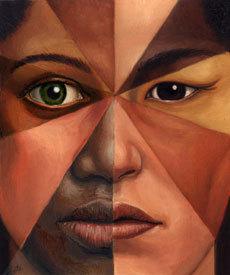
Michelle Doon
April 10, 2015, 5:13 p.m.

As a 25 year old woman of Trinidadian Indo-Caribbean decent, I have been subject to shadeism. Shadeism is discrimination that exists between the lighter-skinned and darker-skinned members of the same community; lighter skin tones are privileged over darker ones and viewed to be more beautiful. Growing up as a child I never heard messages that light skin was better than dark skin or that skin bleaching creams were the ultimate solution to my problematic dark skin.
Not until that fateful spring in 2008 when I traveled to a family wedding. A family acquaintance who had not seen me in years kindly remarked: “You lightened out! You used to be so dark when you were little. You’re gorgeous now!” So, I wasn’t gorgeous then? What did the shade of my skin have to do with beauty? It was only then did I realize that I was dark-skinned and experience the stigma that came along with it. It didn’t help that on that very same trip, I experienced something even more damaging than words. I had walked into a beauty salon expecting to get a normal facial, and walked out with a face a shade or two lighter than I had walked in with. The esthetician, perhaps thinking that she was doing me a favour, took it upon herself to bleach my face without my knowledge. There was never something wrong with me, until then. I began to resent the sun.
These experiences followed me for years and created feelings of self-loathing and insecurity. Never in my life had I believed that being dark skinned was an inherently “bad” or “ugly” thing. Shadeism began to dictate what I wore; I stopped wearing yellows, lime greens and fuchsia for fear that they would make me look darker than I already was. I hated stepping into a makeup store because I would be met with “Sorry hun, that brand doesn’t carry foundation in shades that dark”. It wouldn’t be so hard to be pretty if only I was lighter.
I felt the looks of amazement when my light skinned Indian partner and I walk into a room full of other light skinned Indians. I can almost hear their thoughts: “How dare you have a relationship with this light skinned man?” and “Why would he choose to be with you?” I have explained to my partner, tears rolling down my cheeks that I am a problem. My dark skin is a problem. Despite being met with explanations that it does not matter what colour I am and that my skin has no affect on his feelings for me I still found myself staying out of the sun. Despite what he said, it did matter.
It was not until 2010 when I was walking around campus during my undergraduate years that I came across a poster advertising the screening of the documentary Shadeism. It was refreshing to know that my experiences had a name and that countless others felt the way that I did. I learned about how the media and cultural and social expectations were at the root of my insecurities. I realized that what I had experienced was not just insecurity but oppression. Close monitoring of my skin tone was oppressive. The perception that dark skin needed to be bleached was oppressive. Feeling like I was not good enough for my partner on the basis of my complexion was not simply something of my own creation. Created by colonialism, nurtured by culture and perpetuated by the media, light, white skin was and is continually placed on a pedestal. Another standard. As a woman of colour, I faced a double whammy. Not only would my body never be the “right” shape and size, my skin would never be the right shade.
Fast forward to graduate school, I made it my mission to expose shadeism in all of its ugliness. I conducted a research study and invited five young, women of colour to share their stories. Shadeism is discrimination and is more than skin deep. It is a legacy that women of colour never asked for nor wanted. Today, speaking about it and sharing with I know with others has made it tolerable for me.The sun is not my biggest problem. The shade of my skin does not determine my worth. I am not the problem, the idea that my skin is a problem, is the problem. Loving the skin I’m in is a fight for me. Some days I win; some days I feel like I’m losing, but I think that’s ok.
Michelle Doon is a Registered Social Worker and recent graduate of the Master of Social Work program at York University in Toronto. She is an Outreach and Education Volunteer at the National Eating Disorder Information Centre (NEDIC) and is passionate about talking to young girls and women of colour about body image, eating disorders and shadeism.